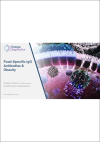Tips for People with Trigger Happy Mast Cells

Each patient has a unique ability to clear histamine, however support can be offered independent of a patient’s unique enzyme status. We would suggest the following:
Microbiota support
Take a high-quality probiotic.
Research suggests that certain strains of high-quality probiotics, such as Lactobacillus rhamnosus, Bifidobacterium lactis, and Lactobacillus plantarum, may help to reduce histamine levels. These probiotics improve gut health, reduce inflammation, and promote the growth of beneficial bacteria that can help break down histamine.
Eating a low histamine diet
Some foods, such as aged cheeses, fermented foods, processed meats, shellfish, nuts, citrus fruits, chocolate, and tomatoes are high in histamine. By avoiding these foods and opting for fresh fruits, vegetables, and lean proteins, you can reduce your intake of histamine or foods that can trigger the release of histamine.
Using nature’s own antihistamine pharmacy
Natural antihistamines found in certain herbs and supplements can help alleviate histamine intolerance symptoms by blocking the effects of histamine on the body. Natural antihistamines that may be helpful with histamine intolerance include the following:
- Quercetin: A flavonoid found in foods such as onions, apples, and berries. May be found in supplement form.
- Vitamin C: A natural antihistamine that can help to reduce inflammation and support immune function.
- Nettle leaf: A natural antihistamine that can help to reduce symptoms of allergy. Drink nettle leaf tea.
- Butterbur: A plant with natural antihistamine properties available in supplement form.
- Omega-3 fatty acids: Omega-3 fatty acids found in fatty fish or fish oil supplements can help to reduce inflammation in the body, which may help to alleviate allergy-like symptoms.
Drinking water/supporting hydration
Drinking enough water can help manage histamine intolerance symptoms.
Histamine is a byproduct of many cellular processes in the body and needs to be eliminated through urine. Drinking enough water can help to flush out histamine (along with other toxins) from the body and prevent it from building up and triggering symptoms.
Dehydration can trigger the release of histamine in the body, leading to symptoms such as headaches and skin irritation.
Proper digestion is important for managing histamine intolerance because poorly digested foods can trigger histamine release. Staying hydrated can help support proper digestion.
For interest, symptoms most commonly related to histamine intolerance include:
- Headache
- Itching
- Flushing
- Hives
- Nasal congestion
- Gastrointestinal symptoms
- Low blood pressure
- Difficulty breathing
Potential causes of histamine intolerance include:
- Enzyme deficiencies
- Histamine rich foods
- Medications
- Gastrointestinal issues
- Stress
- Genetics
- Underlying medical conditions
- Hormones








